Hitachi vs. Western Digital vs. Seagate: A Battle of the Mammoths
by Purav Sanghani on December 2, 2005 12:05 AM EST- Posted in
- Storage
Real World Tests
Synthetic benchmarks are not always the best gauge in measuring the "real" performance of hardware, which is why we have incorporated a few real world tests in our storage reviews. One of our tests, the file system performance test, measures the drive's ability to handle file zip, unzip, and copy operations. This is a great measure of how one drive compares to another and we have put together a group of tasks that most of us typically use.
File System Tasks Within Drive
Synthetic benchmarks are not always the best gauge in measuring the "real" performance of hardware, which is why we have incorporated a few real world tests in our storage reviews. One of our tests, the file system performance test, measures the drive's ability to handle file zip, unzip, and copy operations. This is a great measure of how one drive compares to another and we have put together a group of tasks that most of us typically use.
File System Tasks Within Drive
- File Zip Test - We take a 300MB file and measure the time that it takes for our test bed to compress it to ZIP format. We then run the test again with 300 1MB files to see how the drive performs when working with multiple files.
- File Unzip Test - Using the same methodology as the File Zip Test, we take a ZIP file of a single 300MB file as well as a ZIP file of 300 1MB files and measure the time that it takes to uncompress each ZIP successfully.
- File Copy Test - We measure how long it takes for the system with our test drive to copy a single 300MB file as well as 300 1MB files.
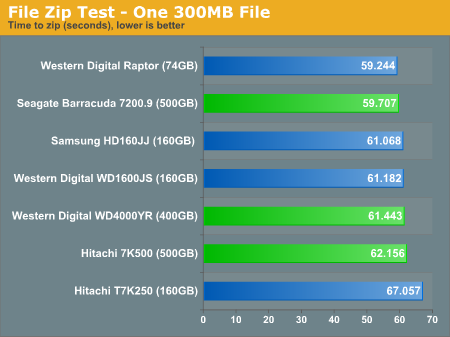
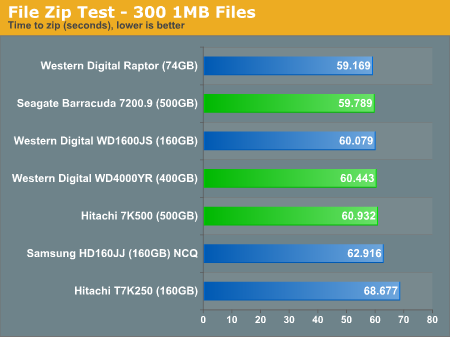
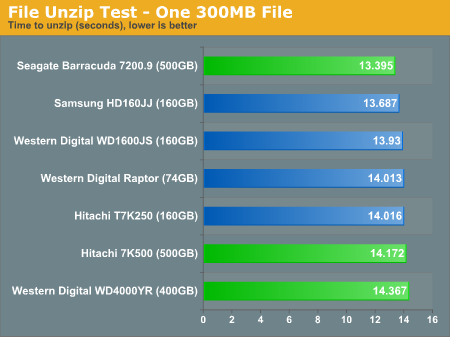
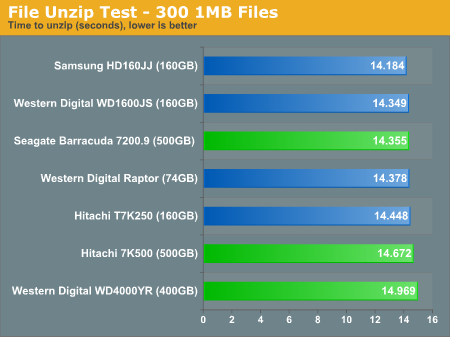
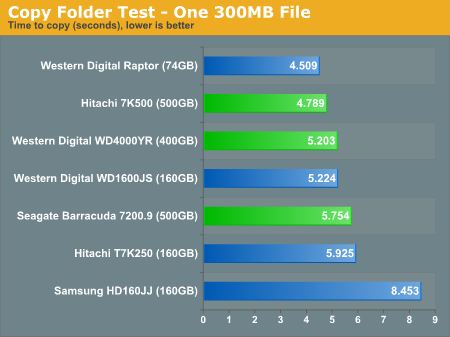
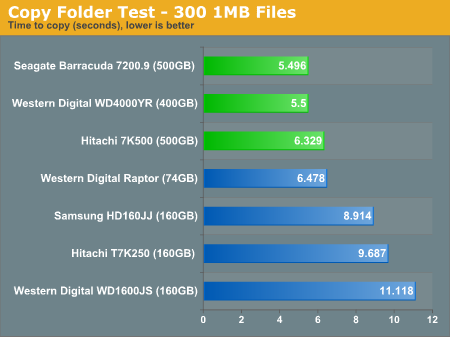
The File Zip/Unzip tests are more dependent on the CPU than the File Copy tests which is why we see the extremely close results. The File Copy test shows Hitachi's 7K500 performing slightly quicker than the Seagate and Western Digital drives.










46 Comments
View All Comments
Visual - Saturday, December 3, 2005 - link
i cant imagine what error would hang my drive for 8 seconds :/ and if it really happened, even in recoverable error, i'd not trust that drive again anyway. so it'd be better to mark it "failed"Lakeshow - Saturday, December 3, 2005 - link
Yeah I read that article on storagereview.com couple days after I got my WD4000YR and it kind of bothers me.Oh well, what are you gonna do? I absolutely love this drive. I can only hope this drive will live until my next voluntary upgrade.
Lifted - Friday, December 2, 2005 - link
The HD Tach screenshots say "for non-commercial or evaluation use only, see license agreement."Hmmmmm. Anandtech is non-commercial?
Gannon - Friday, December 2, 2005 - link
I'd like to see more tests done on drives that are at least 80% full because a lot of us pack our drives full of stuff and the performance we end up getting is when we've filled it. While these tests are good and all, I think they inflate the actual scores of how a drive is really used. No drive sits with just XP and a game or two and a couple of test files, that bias's the tests toward unrealistic use of how hard disks are used, especially big ones over 160GB. I fill my drives regularly and I have over 800GB needless to say I'm backing up stuff to DVD's just to have enough space to perform other operations.WileCoyote - Friday, December 2, 2005 - link
Why does everyone want Anandtech to benchmark their current system? Run your own benchmark if you want to know the speed of your hard-drive/computer. I think the articles here are perfect - they help me decide what to purchase in the future. I don't need an article to make me feel good about what I already have. I like the current format of articles that educate me on my next purchase.johnsonx - Friday, December 2, 2005 - link
time to cut down on the pron addictionOlaf van der Spek - Friday, December 2, 2005 - link
> We were also surprised to see the WD4000YR perform so well, since it is using the 1 st generation 1.5Gb/sec interface.That's a joke, right?
I hope you weren't really expecting a significant performance improvement from a faster interface (300 mbyte/s instead of 150 mbyte/s while HDD's are more near 75 mbyte/s and only during seqential access).
bob661 - Friday, December 2, 2005 - link
I think the interface increases benefit RAID performance more than singledrive performance.Olaf van der Spek - Friday, December 2, 2005 - link
I don't think so, as (without involvement of port multipliers) SATA is a point to point architecture.yacoub - Friday, December 2, 2005 - link
Or you can go buy a pair of 200GB Samsung SpinPoint SP2004C drives for under $100 each and have a much quieter drive setup. :)